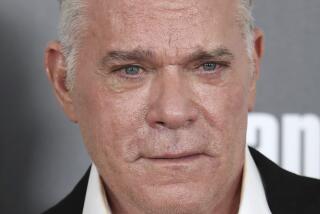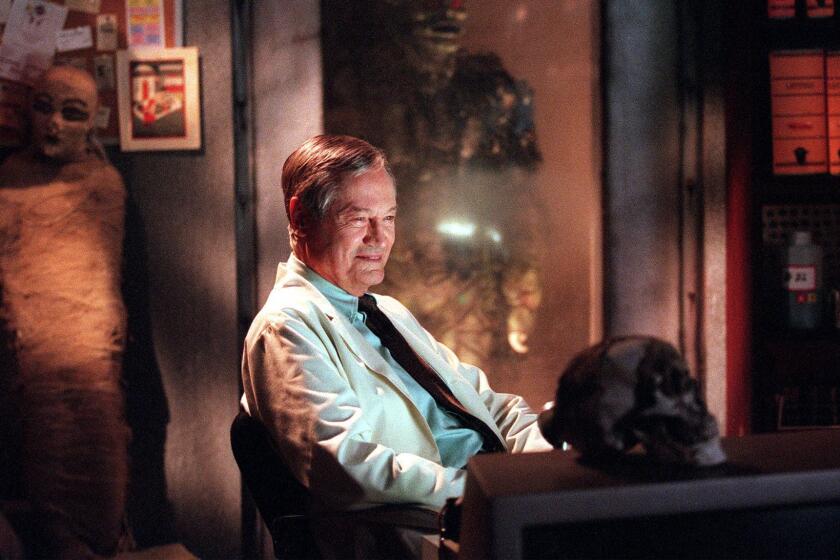‘Unlikely love stories’
PETER MORGAN is having an entire Hollywood career in the span of a few months. He wrote best picture contender “The Queen,” adapted “The Last King of Scotland” for likely Oscar nominee Forest Whitaker and wrote the hit London play “Frost / Nixon,” which Morgan will adapt for director Ron Howard.
On a recent afternoon, the 43-year-old British writer was hardly the star attraction inside a West Hollywood restaurant. That honor went to Jennifer Lopez, seated two tables over. As more than a dozen paparazzi literally climbed over the restaurant’s walls for a shot of the “Gigli” star, Morgan -- when he wasn’t marveling over the photographers’ pluck -- talked about what he calls his “insane, perfect storm” of a year.
Do the two movies and the play have anything in common?
I see each of them as a sort of love story. I am not remotely interested in politics, which seems strange in that I’m writing about politicians all the time. I look at two characters and I think to myself, “Character A and Character B. That’s an extraordinary mix, an extraordinary cocktail.” Idi Amin and this little boy from Scotland. The Queen of England and Tony Blair. David Frost and Richard Nixon. The common thread to me is unlikely love stories -- connections where you would never imagine a connection.
So in “Frost / Nixon,” the story about the 1977 televised interview, David Frost giving Richard Nixon a pair of Gucci loafers is more important than Nixon revealing he thinks he’s above the law?
Absolutely. Because talking about Nixon’s humanity is somehow more revolutionary than putting Nixon on trial. To me, there seems to be a direct correlation between a person’s level of ambition and emotional damage. So, by default, writing about powerful people is also writing about damaged people.
And writing about damaged people ...
... is writing about interesting people. And somehow, I like to repair the wounds. People that are unlikable -- I try to find a way into liking them.
What do you like to see in your and other people’s writing?
The Holy Grail, I think, is to somehow find a piece where you are entertained on a visceral, storytelling level -- I am just a story junkie -- but at the same time, you are really challenged as an adult. The two often work in counterpoint -- the more you’re entertained, the less you’re challenged and vice versa.
“The Queen” seems very affectionate toward Prime Minister Tony Blair, and he’s as divisive in England as President Bush is in the United States.
If you couldn’t write him sympathetically in the summer of 1997, there is no time when you could do it. It was his finest hour.
Do British moviegoers come to “The Queen” with unique expectations?
The tradition in the United Kingdom is to treat our leaders only with satire -- cartoons, “Spitting Image,” wild caricatures. So the shocking thing about “The Queen” is to be looking at the queen in a way you might be looking at a complex woman in her 70s: She feels, breathes, loves, hurts in every bit as complex a way as we all do.
How’s Helen Mirren?
She looked so hot yesterday. I was in the limo with her, going from one thing to another, and she had to strip off. She is so naughty. She’s a woman who has had no surgery whatsoever, has just allowed herself to get old, and most boys from 16 to 65 still would, well.... She’s got such a sexy brain too.
The scenes of torture in “The Last King of Scotland” are horrific. Meat hooks through nipples?
I take great pride in the meat hooks. I have never written violence before -- in 17 years of writing, I’ve never had guns in anything I’ve ever written before.
How should moviegoers leave “The Last King of Scotland?”
You should have absolutely no compassion or understanding left for Idi Amin. But I would like to think for the first half of the film, you have a great deal of compassion and understanding for him. And given that dictators are not born but made, that you have some understanding for how he gets there.
Beyond “Frost / Nixon,” what’s next?
I am about to do another book with [“The Queen” director] Stephen [Frears], about the 44 days when Brian Clough was the soccer manager for Leeds United in the mid-1970s. It’s an insane thing to be doing. At the one moment where we perhaps could be cashing in and making some money, we are going back to make an unbelievably small movie for television. Nevertheless, it’s absolutely riveting.
More to Read
Only good movies
Get the Indie Focus newsletter, Mark Olsen's weekly guide to the world of cinema.
You may occasionally receive promotional content from the Los Angeles Times.







